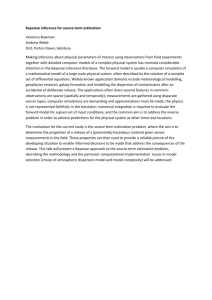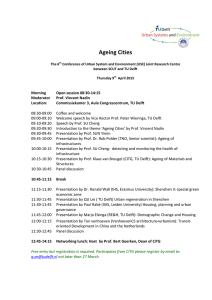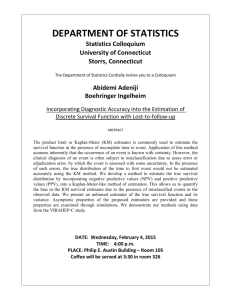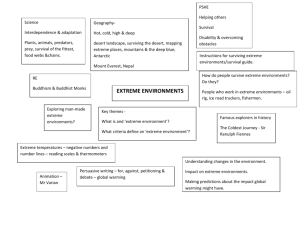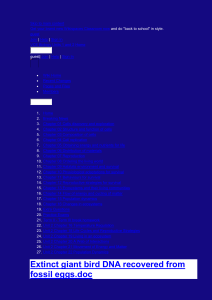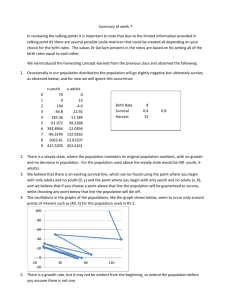NEW MODELS IN SURVIVAL ANALYSIS
advertisement
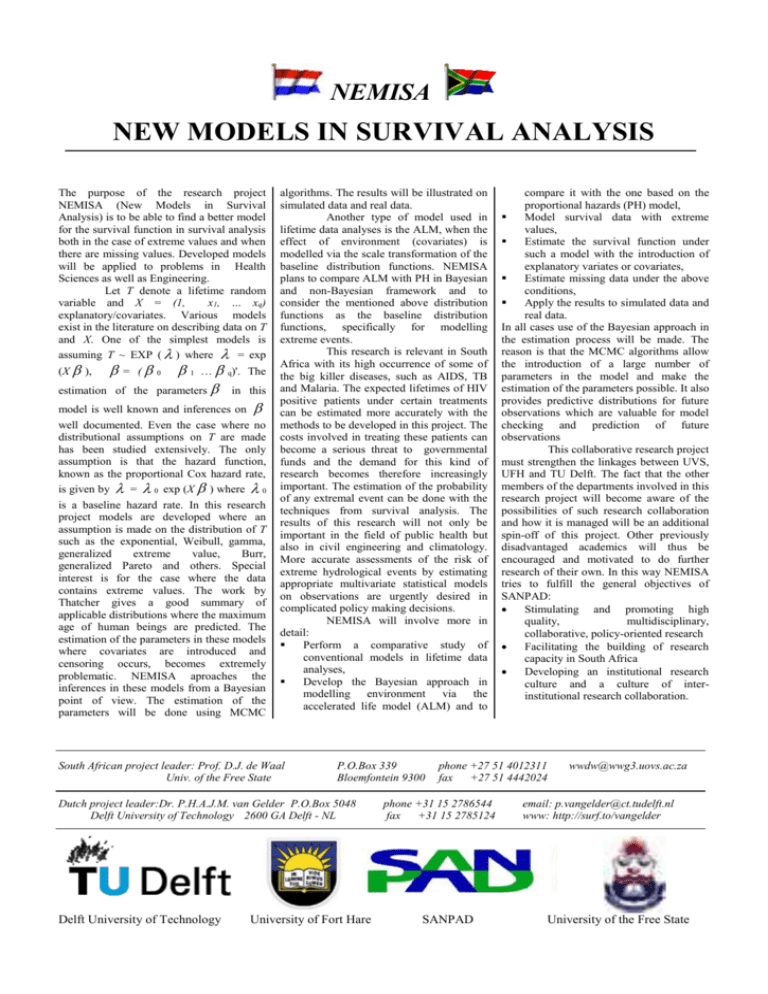
NEMISA NEW MODELS IN SURVIVAL ANALYSIS The purpose of the research project NEMISA (New Models in Survival Analysis) is to be able to find a better model for the survival function in survival analysis both in the case of extreme values and when there are missing values. Developed models will be applied to problems in Health Sciences as well as Engineering. Let T denote a lifetime random variable and X = (1, x1, … xq) explanatory/covariates. Various models exist in the literature on describing data on T and X. One of the simplest models is assuming T ~ EXP ( ) where = exp (X ), = ( 0 1 … q)'. The estimation of the parameters in this model is well known and inferences on well documented. Even the case where no distributional assumptions on T are made has been studied extensively. The only assumption is that the hazard function, known as the proportional Cox hazard rate, is given by = 0 exp (X ) where 0 is a baseline hazard rate. In this research project models are developed where an assumption is made on the distribution of T such as the exponential, Weibull, gamma, generalized extreme value, Burr, generalized Pareto and others. Special interest is for the case where the data contains extreme values. The work by Thatcher gives a good summary of applicable distributions where the maximum age of human beings are predicted. The estimation of the parameters in these models where covariates are introduced and censoring occurs, becomes extremely problematic. NEMISA aproaches the inferences in these models from a Bayesian point of view. The estimation of the parameters will be done using MCMC algorithms. The results will be illustrated on simulated data and real data. Another type of model used in lifetime data analyses is the ALM, when the effect of environment (covariates) is modelled via the scale transformation of the baseline distribution functions. NEMISA plans to compare ALM with PH in Bayesian and non-Bayesian framework and to consider the mentioned above distribution functions as the baseline distribution functions, specifically for modelling extreme events. This research is relevant in South Africa with its high occurrence of some of the big killer diseases, such as AIDS, TB and Malaria. The expected lifetimes of HIV positive patients under certain treatments can be estimated more accurately with the methods to be developed in this project. The costs involved in treating these patients can become a serious threat to governmental funds and the demand for this kind of research becomes therefore increasingly important. The estimation of the probability of any extremal event can be done with the techniques from survival analysis. The results of this research will not only be important in the field of public health but also in civil engineering and climatology. More accurate assessments of the risk of extreme hydrological events by estimating appropriate multivariate statistical models on observations are urgently desired in complicated policy making decisions. NEMISA will involve more in detail: Perform a comparative study of conventional models in lifetime data analyses, Develop the Bayesian approach in modelling environment via the accelerated life model (ALM) and to South African project leader: Prof. D.J. de Waal Univ. of the Free State P.O.Box 339 Bloemfontein 9300 Dutch project leader:Dr. P.H.A.J.M. van Gelder P.O.Box 5048 Delft University of Technology 2600 GA Delft - NL Delft University of Technology University of Fort Hare compare it with the one based on the proportional hazards (PH) model, Model survival data with extreme values, Estimate the survival function under such a model with the introduction of explanatory variates or covariates, Estimate missing data under the above conditions, Apply the results to simulated data and real data. In all cases use of the Bayesian approach in the estimation process will be made. The reason is that the MCMC algorithms allow the introduction of a large number of parameters in the model and make the estimation of the parameters possible. It also provides predictive distributions for future observations which are valuable for model checking and prediction of future observations This collaborative research project must strengthen the linkages between UVS, UFH and TU Delft. The fact that the other members of the departments involved in this research project will become aware of the possibilities of such research collaboration and how it is managed will be an additional spin-off of this project. Other previously disadvantaged academics will thus be encouraged and motivated to do further research of their own. In this way NEMISA tries to fulfill the general objectives of SANPAD: Stimulating and promoting high quality, multidisciplinary, collaborative, policy-oriented research Facilitating the building of research capacity in South Africa Developing an institutional research culture and a culture of interinstitutional research collaboration. phone +27 51 4012311 fax +27 51 4442024 phone +31 15 2786544 fax +31 15 2785124 SANPAD wwdw@wwg3.uovs.ac.za email: p.vangelder@ct.tudelft.nl www: http://surf.to/vangelder University of the Free State SANPAD - Workshop on New Models in Survival Analysis 18-19 April 2002 TU Delft, Civil Engineering Building (Room 2.62 - 2.64) Programme Thursday 18 April 10.00 Opening by Dr. PHAJM van Gelder 10.05 An overview of SANPAD by N. van der Lans MSc. 10.15 The mixed linear model applied to heavy tail distributions by Prof. DJ de Waal 10.45 The use of modelling in survival analysis by Prof. J Tyler 11.15 Coffee 11.30 Life quality models by Dr. PHAJM van Gelder 12.00 Lunch 12.45 Modelling failure rates by mixtures by Prof. MS Finkelstein 13.15 Student presentation by Lucky Mukatlhe MSc 13.45 Departure to AIDS department of Amsterdam Medical Centre (AMC) 15.00 Welcome by Mrs. C.M.Roozeman 15.15 Movie on the AMC 15.30 Presentation by Dr. F.W.N.M.Wit (clinical epidemiologist) 16.15 Tour through the AMC 18.00 Dinner for invited workshop participants in Amsterdam Friday 19 April 9.00 Coffee 9.10 Survival models by Prof. RM Cooke 9.40 AIDS survival models by Dr. R Geskus 10.10 Copula by Dr. D. Kurowicka 10.40 Bayesian Estimate and Inference for Entropy and Information Index of Fit by Prof. T. Mazzucchi 11.10 Coffee 11.30 Review of ZEDB data base processing methodology by C. Bunea MSc 12.00 Lunch 13.00 A critical review and some new proposals in extreme quantile and tail estimation by Prof. J Beirlant 13.30 The use of lifetime distributions in bridge replacement modelling by Prof. JM van Noortwijk 14.00 Coffee 14.30 General discussion 15.00 Closure 15.30 Team members discussion: evaluation of the workshop and research planning for 2002 and further. 18.00 Team members dinner in Delft Annual report available on: http://www.hydraulicengineering.tudelft.nl/public/gelder/sanpad011.zip
